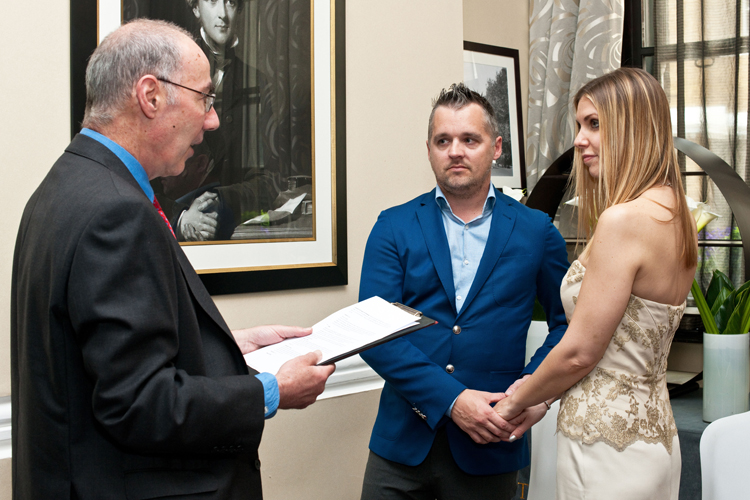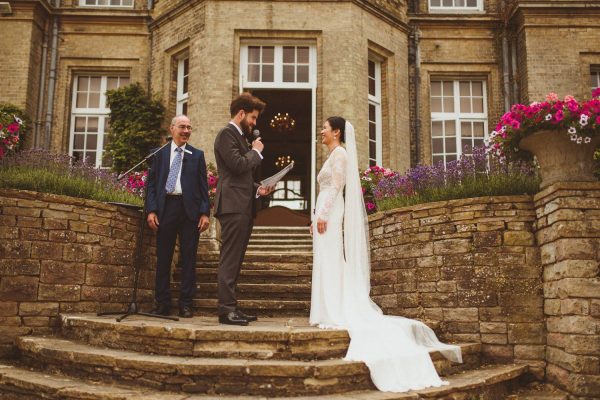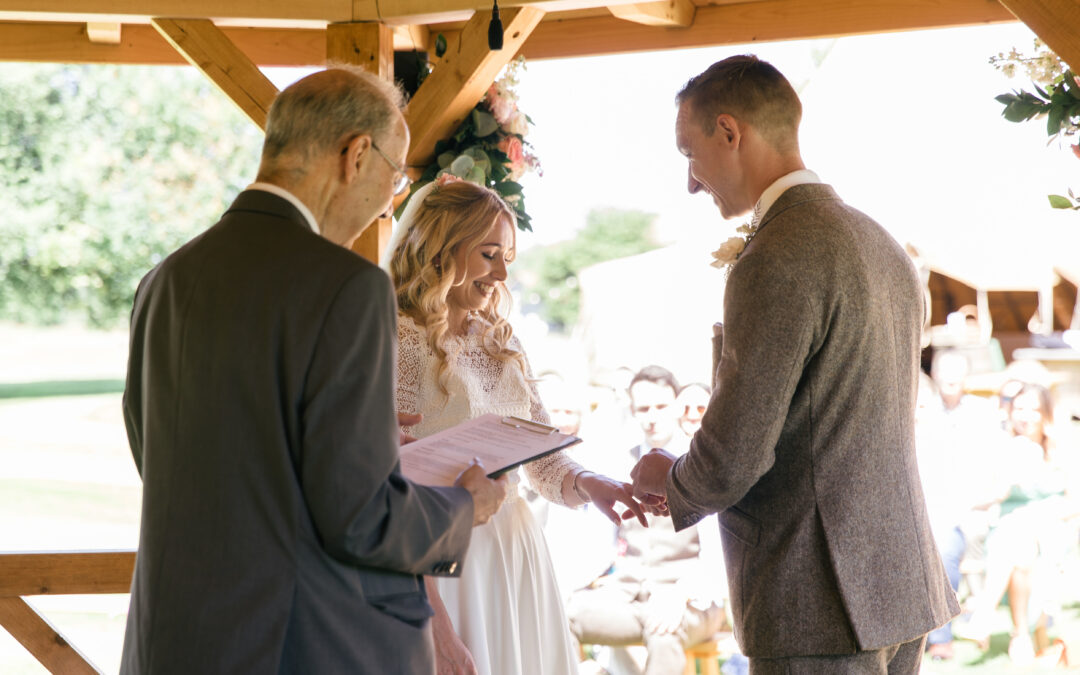
by Michael | Apr 30, 2024 | Blog
I’ve been a Civil Celebrant for some 11 years now.
Up until about 2009 I don’t think I had even heard of the profession, far less knew what a civil celebrant actually did.
So it doesn’t surprise me that there are a lot of people out there for whom the job of civil celebrant is a mystery.
Perhaps I may clarify a few things?
What I am Not
One area of confusion is that there are various types of celebrant out there.
Some offer a totally religious take; others, like the Humanists, do not. A Humanist is supposed to conduct a completely secular service, without even a mention of God.
An independent civil celebrant like myself can lead a fully secular service too, but is also able to offer a part-religious or mixed-faith service (or even a full religious one).
Your Venue and the Timing
Although the law was supposed to have changed by last July, it still stands that a legal ceremony must take place at a Register Office or at a place licensed for weddings.
In both instances, you cannot necessarily marry any day or time you choose.
The advantage of a civil celebrant ceremony is that there are no restrictions to constrain your choices. Indoors, outdoors, in a hotel, on the beach, weekday evenings, Sundays – you name it, the celebrant can accommodate you.
What’s in the Ceremony?
The celebrant-led ceremony may be a great many things.
It can be religious and quite conventional. It may be quite woo-woo, with pagan rituals, for example. It can be a combination. To decide on the sort of ceremony – and its tone and content – have a chat with your celebrant and get a few ideas (or explain your own).
This preliminary chat is invaluable as you can discuss the elements to include and also who (if anyone) is going to participate and how. You also get to know the celebrant a bit. That way, you can ask questions and check that you will be happy working with them.
So now a little of the mystery has been unveiled, I trust! You can see how the celebrant-led ceremony will ensure that you have the unique, personalised ceremony of your dreams.
If you want to discuss this further, please get in contact with me.
Photo: Victor Shack

by Michael | Mar 28, 2023 | Blog
Well, of course, you need to define what you consider luxury.
Cons
There aren’t really too many cons, in truth. The bottom line is that you can have a ceremony without a celebrant. If it’s a wedding, you can go down the Church or Register Office routes. They cover everything.
If a ceremony doesn’t need official documentation, technically anybody can conduct the ceremony. So you can ask a friend or relative to do so.
Therefore, technically, using a celebrant is indeed a luxury.
Pros
To despatch the second objection first, if you’re not using a professional celebrant, you may not get the ceremony you are hoping for. It may be difficult to design a suitable service without the guidance and ideas of a celebrant. Moreover, a celebrant knows how to present in public, and will do a lovely job. They will enhance the ceremony.
The first objection is a matter of choice.
You can opt for a religious ceremony (Church). You get the standard service and you know what you’re getting. It won’t be personalised, but that’s fine for some people.
The Register Office service is also standardised. It won’t really be personalised and, in contrast to the religious ceremony, it will be totally secular. You can’t mention God at all, for example. Most Registrars haven’t been trained to present with panache, so the service, which lasts about a quarter of an hour, is rarely particularly special. However, some couples are content with this.
Of course, until such time as the law changes (which should happen this summer), you need to use one of the two above options to comply with the law.
So, in that respect, using a civil celebrant would almost be duplication.
However, the professional services of a celebrant normally include the following:
- The chance to discuss your vision of your ceremony and build a unique service
- Advice and ideas based on (possibly) years of experience
- Respect for your input
- Numerous conversations/emails and drafts to get the order of service just right
- Help with the choreography of a big event
- A trained public speaker
- Professional pride and passion
One of my USPs is that I offer knowledge of languages (French, German, Russian, ability to read Hebrew and Czech), which has proved useful and popular.
Costs
Some celebrants’ package will cost over £1,000. Some will ask half that. (As I write, I’m somewhere in between.)
I would love the chance to make a real difference to your special day.Do contact me for a non-obligation chat.
People who use me are convinced that I am not a luxury!
Evidence
Let me finish with a quote from just one of my happy couples:
“From our first meeting with Michael we came away feeling very confident we would like to use him for our ceremony. His calming yet assertive demeanour put us at ease and we knew he would blend and adapt to what we had planned very well. Michael injected some fantastic ideas along with some beautiful readings and on the day there wasn’t a dry eye in the room. The whole process was very fluid and professional but always with a smile. We couldn’t recommend him enough.”
photo: Matt Penberthy

by Michael | Feb 27, 2023 | Blog
For many people, using a celebrant is a grey area. What exactly is a Civil Celebrant? What do they offer? Why use one at all?
The expected benefits
If you use a civil celebrant, you expect a friendly, professional service. You can count on them to offer sensible advice, make suggestions of ways to make your ceremony stand out. They should be attentive to your desires and seek to understand your vision.
They should listen to you and not necessarily impose their own ideas. They will work together with you as a well-informed friend, and aim at delivering the best service possible.
They should respond promptly to your enquiries or concerns and be pro-active, when needs be.
They should be good writers, able to put together that special ceremony in a special way.
On the day, they should arrive in good time and check that all is prepared. They put the main actors’ minds at rest. Then, they should deliver a fabulous ceremony!
The ‘added value’
The fact that the celebrant has experience, gained from training and from being ‘in the driving seat’, is invaluable. There’s no substitute for having been there and done it at such a major occasion.
The celebrant’s individual personality will fit certain couples better than others. You can match them up with your desires and needs.
This experience can also matter when planning the ceremony. The celebrant can suggest ideas that may chime with your vision or even advise what might not really work.
The celebrant should be able to present in public clearly and with feeling. They should also be able to relate to the couple (or whoever) as well as making the guests feel included.
Working with me
When you book me, we’ll be working together to come up with a unique, tailor-made ceremony that fits with your vision, beliefs and wishes. Your ideas and choices will be acknowledged and acted upon, so that the final version will have been totally approved by you. There won’t be any unpleasant surprises!
To have a chat about how it can work, please contact me.
Photo: samyaz.sproutstudio.com

by Michael | Dec 5, 2022 | Blog
There’s a lot of confusion about what a civil celebrant offers and, indeed, why you should use one. I’d like to clear things up now.
This does add to the mix, but we are awaiting a possible change in the law, due to be promulgated in July 2023. This could allow civil celebrants to conduct weddings that would be legally recognised. But for the moment we have to wait and see, so I shall proceed using the facts currently in place.
A lot of people mistake a civil celebrant for a registrar. Currently, couples have to be married by the registrars (or in certain religious venues such as C of E churches). This can be in the Register Office (with two witnesses) or at a licensed venue (but rules have changed somewhat for these recently).
The registrars are civil servants who are not necessarily trained in presenting professionally. They often conduct a standardised service that lasts around a quarter of an hour. It is purely secular (God – or even religious motifs – may not be mentioned).
You may wonder why it’s worth having a celebrant-led ceremony too, if you have to have a registrar-led one (even if the latter may not be very special).
The big advantage for many couples is that they want their wedding to be the biggest day of their lives. They may have a vision for the ceremony that the registrars simply cannot offer. A civil celebrant is independent and can therefore fulfil most needs. So you can have the ceremony of your dreams (in the place of your dreams).
The celebrant can provide religious elements (or none). You can include rituals that you want and involve the participants that you want. You may choose to mention “absent friends”. Do you want to write and recite your own vows? Not an issue. You can personalise the ceremony with your story (how you met, for example). The tone can be flexible (a mix of solemnity and humour, for example).
The point is that, with a civil celebrant, you can be sure of having a unique, personalised ceremony on your special day.
Michael would be glad to have a (non-obligation) call with you to discuss how he can help realise your vision.
Photo: Matt Penberthy

by Michael | Nov 29, 2022 | Blog
Dealing with wedding suppliers is often a new experience for couples. How do you know whether the service you’re asking about is a necessity or a luxury? What questions should you be asking? How much should you expect to be paying? How do you know that the suppliers are going to be reliable?
Starting out
If you know somebody who has used a particular supplier, then pick their brains. (The fact that they may have liked the supplier does not necessarily mean that they would fit the bill for you, of course. However, it’s a good stepping stone.)
A website may be helpful. It should answer some of your questions and give a feel for the supplier and what they offer. Testimonials may suggest how the supplier works and you can match these assets to your vision for the day.
Contact
Once you’ve narrowed down your choices, phone or meet with the supplier. The questions you ask will depend, according to the product or service you are seeking, and according to your personal inclinations.
Questions
As a minimum, ask the supplier:
- About availability
- Costs (possibly, expect only an estimate at this stage)
- What is included and what is not. This may well vary between suppliers of the same service. As a celebrant, I quote a final, all-in figure, but mention in my Ts & Cs exceptional add-ons.
- Terms and Conditions (including payment terms) – these need to state what you can expect from the supplier, as well as what they can expect from you.
- Cancellation policy
Meeting the Supplier
When you speak to (or, preferably, meet) your supplier, there are things you will need to clarify. (These will depend on the particular supplier’s field, of course.)
You may well need to know what happens if a hired wedding dress is returned dirty. Does the caterer offer gluten-free alternatives? Can the florist supply out-of-season flowers? Does the celebrant offer a rehearsal? Does the planner attend in person, or send a (possibly inexperienced) substitute? What type of photographs does the photographer plan to take? Does the venue provide exclusive use?
It’s important that the supplier buys in to your vision. Of course, they may – should – offer advice, but they need to listen to what you want and accommodate your wishes, if at all possible.
Hopefully, you easily find suppliers who are pleasant and professional. You need to feel confidence in them, and, if not, look elsewhere.
If the supplier you want is a little expensive, maybe you can haggle a bit. (For example, shift from a peak-time date or time.) If that doesn’t work, perhaps you can balance your budget, by finding a supplier for another service for a lower price. Finally, if you really like the supplier, perhaps you can stretch your budget just a bit?
Decision made
Don’t rush into your decision-making. It’s such an important call. So, if in doubt, go back to the supplier and query the issue.
Of course, you should reconfirm with your suppliers nearer the date of your ceremony, but otherwise, if you have chosen well, they should be able to get on with their job effectively.
You should have such a lot less on your mind, come the big day, if you’ve done your due diligence.
If one of the potential suppliers you’re looking for is a civil celebrant, don’t forget that I am available for a chat.
Photo: aiony-haust-xCQm5_9aro0-unsplash




